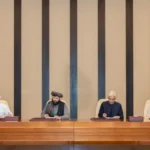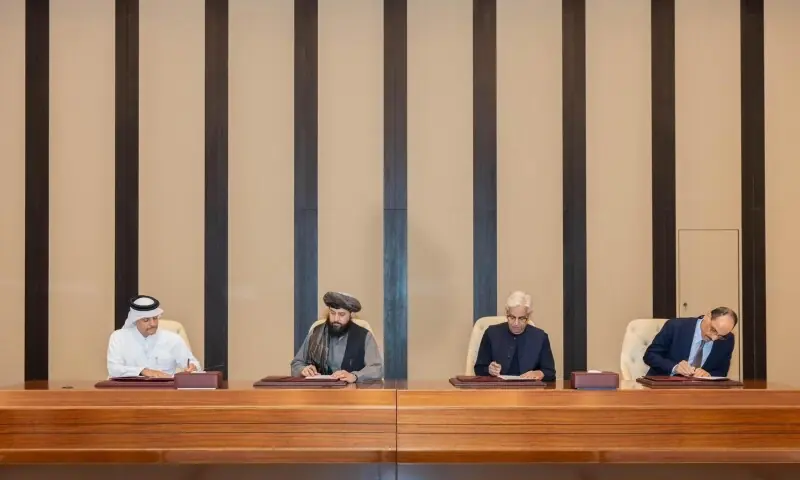WHEN the Taliban returned to power in Afghanistan more than three years ago, Pakistani policymakers assumed this would help ensure the stability of the country’s western border. This has long been a strategic imperative, given Pakistan’s troubled relations with India on its eastern flank.
But the assumption of securing the border with Afghanistan under Taliban rule turned out to be a strategic miscalculation. It did not take long for it to become evident that the Taliban’s takeover allowed the Tehreek-i-Taliban Pakistan to reorganize, revitalize and then intensify cross-border attacks, posing a serious threat to Pakistan’s security. The Taliban’s unwillingness to take action against the TTP disrupted Islamabad’s expectations that Kabul would respond to Pakistan’s security concerns.
Successive reports by the UN Security Council Analytical Support and Sanctions Monitoring Team reinforced Pakistan’s assessment by concluding that “the TTP benefited the most from the Taliban takeover of all foreign extremist groups.” in Afghanistan.” Its latest report from July 2024 says that “the TTP remains the largest terrorist group in Afghanistan, with an estimated strength of 6,000 to 6,500 fighters.” “It continues to operate on a significant scale in Afghanistan and from there conduct terrorist operations in Pakistan.”
The report also says that “the Taliban do not view the TTP as a terrorist group: the ties are close and the debt owed to the TTP is significant.” According to the report, the TTP receives support (and supervision) from Afghanistan’s General Intelligence Directorate with the aim of preventing defections to IS-K, the main enemy of the Taliban. The TTP’s ties to Al Qaeda also continue.
Last year there was a significant increase in cross-border terrorist attacks by the TTP and an increase in casualties of law enforcement personnel, increasing the security challenge for Pakistan. In fact, 2024 was the deadliest year with the highest number of victims in terrorist attacks in almost a decade. Three and a half years of talks on the TTP between Pakistani officials and Taliban authorities yielded little result. The Taliban’s responses ranged from asking for time to “manage” the TTP to urging Pakistani officials to talk to the militant group, as well as offering assurances to relocate its fighters away from the border and asking for financial help to do so.
Neither side wants a breakdown in relations, so re-engaging diplomatically is a must.
With their patience exhausted, Pakistani authorities began to take a harder line towards Kabul, and also launched unannounced kinetic attacks against TTP shrines and individuals in Afghanistan. Public statements by Pakistani leaders became harsher. Taliban leaders were asked to choose between the TTP and Pakistan. Military spokesmen held the interim Afghan government fully responsible for “arming the terrorists and providing them with a safe haven.”
Last week, Prime Minister Shehbaz Sharif demanded Kabul take steps to stop the TTP from attacking and killing innocent people, calling it a red line for Pakistan.
This followed an audacious TTP attack on a border post in Makin in late December, which left 16 security personnel dead and forced Pakistan to retaliate. Days later, on December 24, Pakistani fighter jets carried out airstrikes against TTP hideouts in Paktika province. Taliban authorities lodged an angry protest in Islamabad and claimed that their forces retaliated by attacking several Pakistani positions along the border, including Waziristan. These armed clashes injected further tensions into an already strained relationship.
This at a time when Pakistan’s special envoy for Afghanistan, Muhammed Sadiq, was in Kabul holding talks with Afghan Deputy Prime Minister Maulvi Abdul Kabir and other Taliban officials with the aim of reducing tensions. Overshadowed by the airstrikes, Sadiq’s visit marked an effort to restore ties with Afghanistan after more than a year of coercive political actions implemented by Islamabad. These actions included, in addition to unannounced airstrikes (except the April 2024 attacks which were publicly acknowledged by Islamabad), restrictions on transit trade and the expulsion of illegal Afghan refugees from Pakistan. Kinetic actions are often referred to as intelligence-based operations by Pakistani military officials and are aimed at degrading the TTP’s capabilities.
The coercive actions as a whole were designed to increase the costs to the Taliban for their lack of cooperation in the TTP. These measures produced limited results. Pakistani authorities then decided that fresh diplomatic engagement with Kabul was necessary to avoid a breakdown in relations, resuming dialogue after a year-long pause to explore possibilities for resolving trade and security disputes. Both sides appeared keen to halt the deterioration of relations as bilateral trade and transit trade had declined precipitously over the past year.
Indeed, talks between Taliban officials and a hybrid delegation (which included military officers) led by Sadiq explored avenues to improve economic cooperation. They covered key trade issues, including the renewal of the transit trade agreement and the finalization of a preferential trade agreement, as well as the single document regime that Pakistan is implementing as part of its border control policy. These talks, according to official sources, were moving in a positive direction and in an “atmosphere of cooperation”, with an agreement for high-level visits to resume in January, when the airstrikes occurred.
Although armed clashes and the exchange of heated words between the two countries have put diplomatic engagement on hold, it is expected to resume sooner rather than later. This indicates a tentative shift in Pakistan’s strategy, moving away from a focus solely on coercive actions and a single-issue agenda with the Taliban involving the TTP. But there is an important caveat to this. Pakistani authorities have also indicated to Kabul that any major attack from Afghan soil will prompt Pakistani retaliation and likely intense manhunt. No casualties will be tolerated and Pakistan’s hand will be forced into kinetic measures.
This carrot-and-stick policy will likely shape the planned reset of ties with Afghanistan. Islamabad hopes that the combined effect of diplomatic engagement and trade incentives, as well as pressure on the TTP issue, will encourage Taliban authorities to respond to Pakistan’s security concerns.
Pakistan therefore appears determined to employ both incentives and disincentives in a renewed attempt to prevail over the Taliban. It should also consider developing a regional strategy in collaboration with China and other neighbors of Afghanistan to put collective pressure on Kabul to change course on the issue of terrorism, which remains a common concern for the entire region.
The writer is a former ambassador to the United States, the United Kingdom and the UN.
Published in Amanecer, January 13, 2025.







